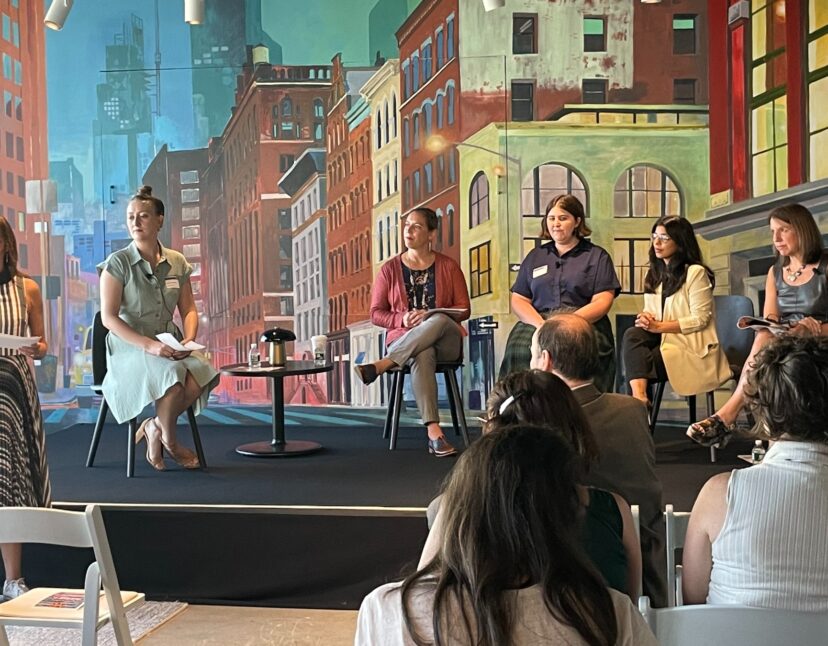LM Live Panel Discusses the Challenges of Post-“Roe v. Wade”

LM Live hosted its first Women’s Breakfast of the season on Wednesday, this one focusing on abortion access in a post-Roe v. Wade world. Garnet Henderson, journalist and host of the ACCESS podcast, moderated a panel of four experts on reproductive rights: Ambreen Molitor, National Director of Innovation, Planned Parenthood; Dr. Marisa Nadas of Jacobi Medical Center and North Central Bronx Hospital; Bella Pori of the Center for Reproductive Rights; and Jennifer Weiss-Wolf of the Birnbaum Women’s Leadership Network at NYU Law.
The June 24 Supreme Court ruling on Dobbs v. Jackson Women’s Health Organization removed the federal right to abortion and threw reproductive access into disarray; most abortions are banned in at least a dozen states, with more state legislatures acting to limit or restrict abortion access in the future. And though abortion rights are still protected in New York State, the constantly-changing landscape for reproductive rights is confusing and frightening.
The panelists each offered unique perspectives on what the fight for abortion rights looks like now. Pori spoke about the legal battles that are being fought in state courts. Legal teams are trying to use protections within state legislatures — which cover privacy, medical decision-making and gender equality, to name a few — to make a case for access in states with restrictions or outright bans. She noted that states like New York can act proactively to protect abortion access for pregnant people who come here seeking treatment, by passing laws that shield providers. Pori also advocated for funding and donating to abortion funds, which pay for pregnant people to travel across state lines to get reproductive care. For now, though, it’s still unclear how far hostile states are willing to go to stop pregnant people from seeking care beyond their borders.
“It’s a very sticky issue,” she said. “We don’t know what states are going to do about abortion access across state lines.”
That confusion extends into the medical field. Nadas noted that though some of the anti-abortion state laws offer provisions that claim to protect the life of the mother, the exceptions are written in non-medical terms. Thus providers have to figure out how to apply them to medical conditions. This means that life-saving care can be delayed as providers, hospital lawyers, etc. determine the urgency of a patient’s situation.
Even if a pregnancy has no elevated health risk, Nadas added, abortion care is essential health care, and any reason to have an abortion is valid and worthwhile. “All people [seeking an abortion] deserve compassionate care, no matter the reason,” she said.
Weiss-Wolf, whose career included a lengthy stint at the Brennan Center for Justice, stressed that even without federal protections for abortion, the federal government could be doing more to at least iron out some of the confusion about pregnancy and abortion.
“When Texas announced a six-week ban, it was not clear that people did not have six weeks to get an abortion. You’re already four weeks pregnant by the time you miss a period,” she said. “The White House could put out a basic PSA that if you live in a six-week ban state, you have two weeks to get an abortion.”
The panelists also discussed the issue of privacy and data collection, something that has been a hot-button topic post-Roe. Immediately after the Dobbs decision, people began voicing concerns about things like period tracker apps, the data from which could be used to investigate and prosecute people seeking abortions. Molitor has worked on Planned Parenthood’s period tracker Spot On, which she advocates is an essential tool for monitoring one’s health; she said that people should continue to track their periods, whether via an app or in a journal or calendar, but that they should be aware of how that data is being collected and who has access to it.
She noted that Spot On is a free app that does not require plugging in any data or credit card/bank account information, and that users do not need to register in order to access it. “We have people who have been using the app for six and a half years, and we don’t know who they are,” she said. “We don’t intend to change that.”
The panelists agreed that much work needs to be done to protect abortion access. They noted that people crossing state lines often need to cover travel and childcare costs; that even in states where abortion access is protected, some patients don’t know what is legal and what isn’t; and that it’s still essential to reduce stigma about abortions and reproductive health. As for what New Yorkers can do right now? Donate to abortion funds, talk about abortion openly and frequently, support pro-choice politicians and, generally, as Molitor put it, “Be your own advocate and be your neighbor’s advocate. There are opportunities for us to help out in that way.”
Tags: lm live, roe v wade

